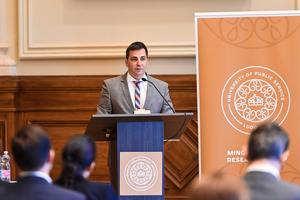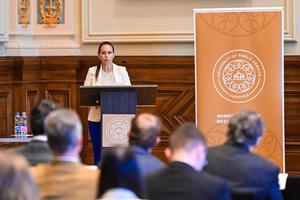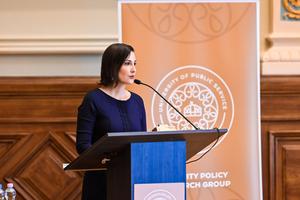After the Second World War, the application of the principle of collective guilt in Central Europe became a so-called ‘good practice’ for the solution of ethnic issues in the region. This policy had a long-term impact not only on the demographics of the region, especially its ethnic, national and linguistic diversity, but also on individual legal relations, for example through the confiscation of private property of individuals belonging to specific ethnic groups.
In the public mind many people believe that the principle of collective guilt is connected to the Holocaust or the Porajamos, the Roma Holocaust, and it no longer affects the legal relations of individuals.
In fact, in some cases, the principle of collective guilt prevails even today, which is why it also affects relations between states and individuals in Central Europe. It is clear, that this chapter of history has not been processed properly, nor even satisfactorily closed. That is why the Minority Policy Research Group of Ludovika University of Public Service (LUPS) on the 8th of November 2023, organized the English-language international conference ’Collective guilt in Central Europe after Second World War and now’. The conference presented the versions of measures and retorts based on the principle of ‘collective guilt’ applied in Central Europe and their consequences that are still alive today.
Gergely Deli, rector of LUPS, said in his welcome speech: ‘After the Second World War, the application of the principle of collective guilt became a common practice in the region. The purpose of the conference is to initiate an academic dialogue on the historical and international implications of the collective punishment of ethnic groups and to point out and discuss their consequences for people living today’. As he said, the event covers a wide range of approaches to the topic, from which various interpretations can be explored.
Iván Gyurcsík, head of the Minority Policy Research Group, explained that their research group was founded in October 2022. In connection with the topic, he highlighted that after 1989, the countries of the region, among others, after joining the European Union and NATO, officially considered the minority issue legally settled. He also mentioned couple of good examples of apologies contributing to the reconciliation process in the region, for example he drew attention to the fact that in 2012 the Hungarian Parliament declared January 19 as the official day of remembrance for the deportation and expulsion of the Germans from Hungary. In addition to this, he also touched on the fact that in 2013 the Serbian parliament condemned the acts committed by the Serbs against the Hungarian civilian population in Vojvodina in 1944-45. He underlined the importance of symbolic gestures of non-state actor, as it was the letters of the Hungarian and Slovak Catholic Bishops’ Conferences of 2006 in which they “Forgive and ask forgiveness”.
Réka Varga, the dean of the university's Faculty of Political Governance and International Studies, underlined the fact that one of the fundamental tasks of international law is the examination of the individual's criminal responsibility against collective responsibility or any other model. As she said, it is difficult to turn off the associative sense in the question of a nation when the committing of war crimes is discussed. She emphasized that the topic raises questions such as what will happen to those who oppose the war. Who would really like to enter the war? Did those who opposed the war have a chance to actually do something about it? How far do citizens' obligations extend in this matter?
American lawyer and writer Alfred-Maurice de Zayas, who is active in the field of human rights and international law, and even worked as the first independent UN expert in promoting a democratic and fair international order, joined the conference online. He described that throughout history, since biblical times we can witness various forms of collective punishment. As an example, he mentioned, among others, the campaigns against the Albigensians in the 12th and 13th centuries, or the troubled times that befell the Protestants in France in later centuries.
The keynote speeches were followed by two thematic sessions, in which international and domestic speakers gave presentations. The first section was about the application of the principle of collective guilt in Czechoslovakia. In his introduction, Balázs Tárnok, head of the Europe Strategy Research Institute of the József Eötvös Research Centre of LUPS and member of the Minority Policy Research Group, highlighted how impeachment was used against Germans and Hungarians after the war, and what historical, moral, political and legal aspects of it can be distinguished. They still affect us to this day.
In his presentation, Jan Rychlík, professor of the Institute of Czech History of Charles University in Prague, discussed the situation of the German and Hungarian minorities in Czechoslovakia, focusing mainly on the confiscation of property and, later, the return of land ownership. As he said, the law related to land reform was applied after 1919, one of the main goals of which was to break the state of the estates. He added that, according to the official position, they did not act according to nationality. The democratic changes of 1989-90 gave researchers the opportunity to examine the question in professionally free conditions, and the states of our region to settle the moral, legal, compensation and other demands.
Juraj Marušiak, a senior research fellow of the Slovak Academy of Sciences, explored the justice system in Czechoslovakia after the Second World War and its impact, from the perspective of the bilateral relations between Slovakia and Hungary between 1993 and 2023.
János Fiala-Butora, senior research fellow of the Centre for Social Sciences, spoke about the impact of the Beneš decrees in Slovakia, which continues to this day. As he reminded: between 1945 and 1948, Germans and Hungarians were considered enemies according to the principle of collective guilt. In his presentation, he explained how the Beneš decrees are applied in Slovakia with retroactive effect to this day, how the principle of ethnically based collective guilt is enforced today, and why this is incompatible with current international legal regulations and human rights standards. The specialist also outlined suggestions for solving the problem.
The topic of the second session of the conference was the usage of the principle of collective guilt in Hungary, Romania and Yugoslavia after World War II.
In her presentation, Réka Marchut, a research fellow at the Minority Research Institute of the Centre for Social Sciences, discussed the issue of responsibility for the expulsion of ethnic Germans from Hungary. After the Second World War, partly in accordance with the Potsdam Conference and partly based on the decision of some victorious states, the native German population living in Central and Eastern Europe for centuries, was subjected to collective punishment: displacements, expulsions.
Tamás Lönhárt, associate professor at the Babes-Bolyai University in Cluj-Napoca, gave a lecture on the collective traumas and retorsions the Transylvanian communities were exposed to in 1944-1947 and how these reverberate in the politics of memory after 1989 and in the transitional justice system in Romania.
Tamás Korhecz, the constitutional judge of Serbia, who participated in the conference in his capacity as a university professor, spoke about how collective guilt in the past in Yugoslavia and in the present, as legal issues related to rehabilitation and compensation, appear in Serbian legal practice. Tamás Korhecz examined the ethnic-based application of the principle of collective guilt in Yugoslavia between 1944 and 48, presented the process and factors of the historical reconciliation in Yugoslavia and in Serbia, as well as the good practices of the Serbian reparation process.





